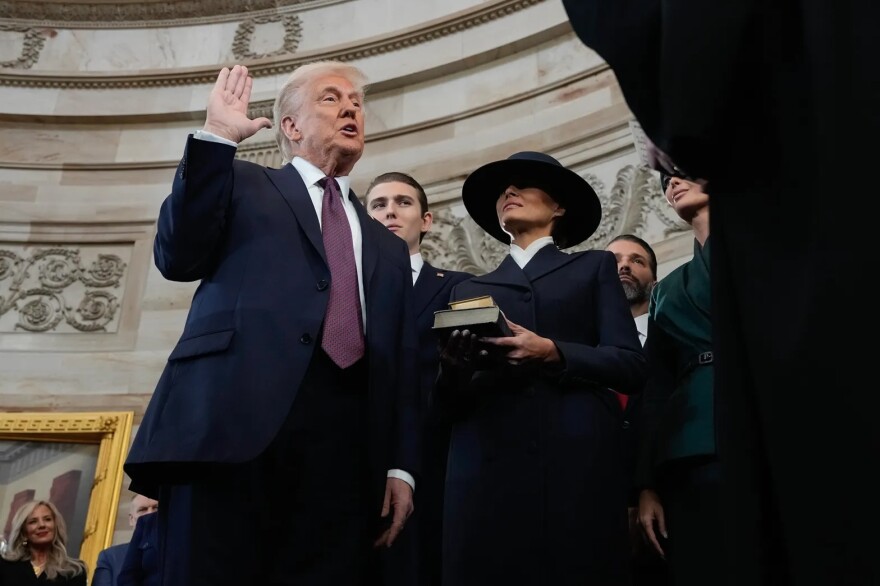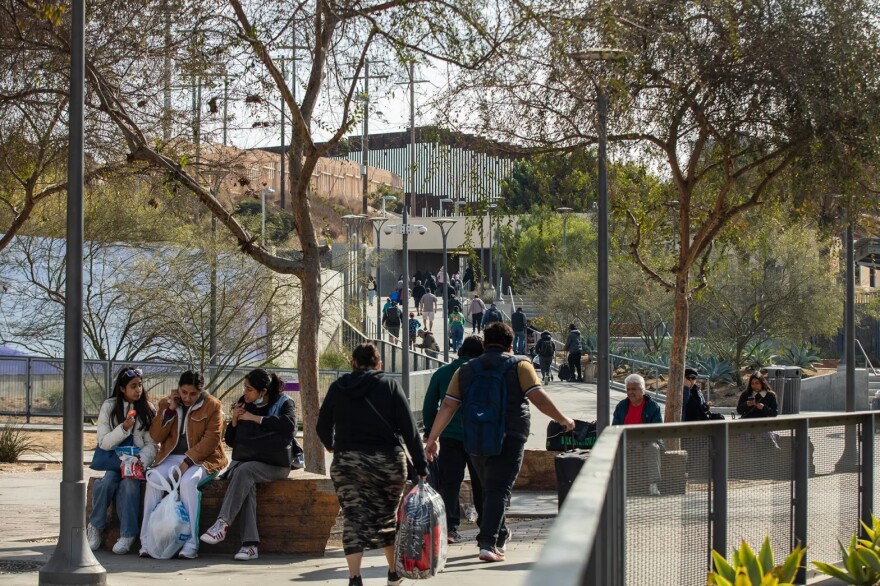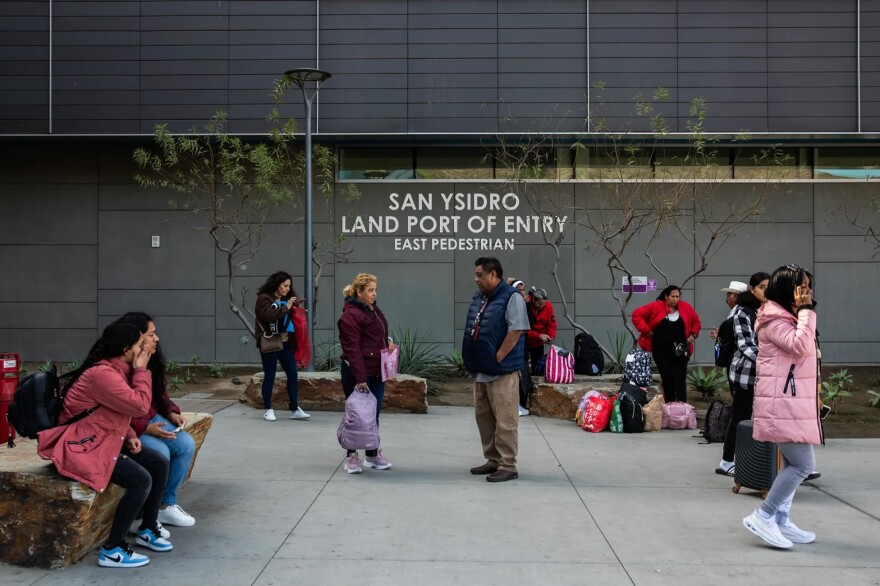Undocumented immigrants and their California families braced for the worst — and many told CalMatters they would go underground — as newly sworn-in President Donald Trump began issuing executive orders to enable what he promises will be the most massive deportation in U.S. history.
“It’s draining my energy a lot, thinking of what’s going to happen and not knowing exactly what’s going to happen with me and my family and my daughters,” said Frank, a resident of northeastern Los Angeles who asked to be identified only by his first name because of his ongoing immigration case.
Advocates reported hearing from parents who were considering keeping their children home from school this week. Some neighbors said they will dispatch their children to shop for groceries and run errands, so they can mostly stay inside the house.
“I plan to just stay very local, no unnecessary trips, and thank God my work is close to my house,” said Frank, who is a restaurant cook and came to this country without federal authorization from El Salvador about 20 years ago.
Kathleen, his wife of seven years and a U.S. citizen, called the situation “terrifying” and said she was worried about him and “what I would be left to deal with and having to take care of our kids on my own.”
In his inaugural speech, President Trump previewed a planned series of executive orders that he began rolling out later in the day. This evening he officially declared a that “requires use of the Armed Forces” — a move for which he can expect to face legal hurdles.
“All illegal entry will immediately be halted, and we will begin the process of returning millions and millions of criminal aliens back to the places from which they came,” Trump continued in his inaugural address, without providing details yet about how he could miraculously end all illegal entry. His tally of noncitizens with criminal convictions is far higher than that reported by federal immigration authorities.
The Republican president also said he planned to reinstate the “Remain in Mexico” policy in place during his first term, which forced asylum seekers to wait in Mexico for their U.S. court hearings to present their immigration cases.
“I will end the practice of ‘catch and release,’ and I will send troops to the southern border to repel the disastrous invasion of our country,” he continued.
As expected, he issued an designating Mexican drug cartels as foreign terrorist organizations. “And by invoking the Alien Enemies Act of 1798, I will direct our government to use the full and immense power of federal and state law enforcement to eliminate the presence of all foreign gangs and criminal networks …” he said.
And he signed yet — the right guaranteeing citizenship to anyone born in the country or its territories regardless of their parents’ immigration status. Trump wants the Supreme Court to reinterpret the provision.
, including California, filed a lawsuit in federal district court in Massachusetts Tuesday, challenging the order on grounds that it violates the Fourteenth Amendment and the Immigration and Nationality Act.
“I am deeply disappointed that we’re here, and also not at all surprised,” said California Attorney General Rob Bonta at a press conference. “This isn’t some theoretical legal disagreement. It would strip Americans of their most basic rights.”
Bonta and the other attorneys general are asking the court for an immediate injunction to stop the order from taking effect on Feb. 19 while they litigate the case. Bonta acknowledged that the case could end up before the U.S. Supreme Court.
“As president of the United States, you have a lot of authority,” Bonta said, “but it is not unlimited.”

By late afternoon Monday on the West Coast, several hundred protesters began marching from San Diego’s Balboa Park to the Hall of Justice, chanting, “When immigrant lives are under attack, what do we do? Stand up fight back!”
“I’m worried about migrant people because this will be really hard for the next four years. It was before too, when Trump had power the last time. It was really crazy for us right there on the border, and we expect the same thing right now or worse,” said Alejandro Ortigoza, 50, the leader of Armadillos Busqueda y Rescate, a group that goes out into the desert to search for the remains of missing migrants.
Yet even as the new president was declaring a national emergency at the U.S.-Mexico border, people whose lives straddle it mostly carried on with business as usual.
Lighter than normal foot traffic continued through the “pedestrian east” crossing at San Ysidro as people calmly headed for the trolley under the familiar noise of a helicopter circling above.
In the Home Depot parking lot in Imperial Beach, day laborers gathered as they usually do, seeking odd jobs helping San Diegans move or clean up their lawns. They said they cross the border every day from their homes in Tijuana and didn’t expect Trump’s executive orders would heavily affect them. Still, several planned to carry documents proving they are naturalized U.S. citizens everywhere they go.
“We don’t know what’s going to happen,” said Juan, a 60-year-old from Sinaloa, Mexico, and a naturalized U.S. citizen who lives in Tijuana and crosses the border daily to work. “It’s not convenient for the U.S., nor for Mexico, to close the border. It won’t benefit either country.”
“I think Trump is very racist….and he’s not right in the head,” he added.
Juan declined to give his last name out of fear of retaliation or harassment for sharing his negative opinion about the president. He keeps proof of his legal status ready. “I always bring my certification, saying I’m naturalized everywhere I go. I have it in my backpack always.”

Saúl Muñoz, a 53-year-old construction worker who lives in the Otay area of Tijuana, predicted an increase in human rights violations under Trump.
“If they remove all the (people who are) undocumented, then yes, we’re going to have more work, but they’re going to want to pay the same as they did before, they’re going to want to pay us less,” said Muñoz. “So, really, who is going to benefit?”
“Throughout the Trump administration, we’re going to see horrors in terms of the attacks that immigrant communities are going to suffer. President Trump will put 5.1 million U.S. citizen children at risk of family separation,” said Kerri Talbot, co-executive director of the Immigration Hub, a national pro-immigrant advocacy group based in D.C.
The most recent of Americans, conducted earlier in January, found that 55% either strongly or somewhat support mass deportations of people living in the United States without authorization.
Public support for deportation was even stronger in certain circumstances: 87% of those surveyed backed deporting those who are “here illegally and have criminal records,” and 63% backed removing those who are “here illegally and arrived over the last four years.”
But just 41% of those surveyed supported ending “birthright citizenship for children born to immigrants who are here illegally.” And only 34% wanted to stop deportation protections for “immigrants who were children when they entered the country illegally.”
“You’re going to concentrate on the worst first, public safety threats first. But no one’s off the table. If they’re in the country illegally, they’ve got a problem.”Trump border czar Tom Homan
It’s not like Trump’s actions today hadn’t been telegraphed far in advance — on the campaign trail, he repeatedly promised to carry out the largest deportation operation in U.S. history. By the end of last week, Trump’s Incoming “border czar,” Tom Homan, was telling that large-scale raids are set to begin as soon as Tuesday.
“There’s gonna be big raids all across the country. Chicago is just one of many places,” said Homan, the former acting director of U.S. Immigration and Customs Enforcement (ICE). “On Tuesday, you’re going to expect ICE … ICE is finally going to go out and do their job. We’re going to take the handcuffs off ICE and let them go arrest ‘criminal aliens.’ That’s what’s going to happen.”
The administration’s plans are likely to encounter significant legal challenges and logistical obstacles, including the challenge of housing millions of detainees before they can be removed.
Threatening to yank California’s federal funds — again
One of Trump’s immigration orders today also y from “sanctuary jurisdictions” that limit collaboration between local law enforcement and federal immigration agencies.
A relies on federal dollars.
“The Attorney General and the Secretary of Homeland Security shall, to the maximum extent possible under law, evaluate and undertake any lawful actions to ensure that so-called “sanctuary” jurisdictions, which seek to interfere with the lawful exercise of Federal law enforcement operations, do not receive access to Federal funds,” one order states. “Further, the Attorney General and the Secretary of Homeland Security shall evaluate and undertake any other lawful actions, criminal or civil, that they deem warranted based on any such jurisdiction’s practices that interfere with the enforcement of Federal law.”
The returning president has long derided California for declaring itself a “sanctuary state” for undocumented immigrants – a move the Democratic-controlled Legislature made during his first term — but the reality is more nuanced. Known here as the the law exempts from its protections people convicted of violent crimes or serious offenses such as felony drunk driving, for example, and allows California state prisons to regularly coordinate with ICE about upcoming release dates for prisoners eligible for deportation.
California during Trump’s first term to beat back his intent to withhold a few federal grants from the state for its failure to fully cooperate with federal immigration authorities. In 2018, a saying the president’s move was unconstitutional.
In December, the San Diego County Board of Supervisors voted 3-1 to prohibit county agencies from using local resources to assist federal immigration enforcement, including cooperation with ICE. But San Diego County Sheriff Kelly Martinez said she will not comply with the county’s new policy, saying the county board does not set policy for her department.
Days before Christmas, a conservative organization led by Trump adviser Stephen Miller and former San Diego County Supervisor Nora Vargas warning they could go to prison over sanctuary policies that protect undocumented residents.
Homan has said he plans to target not just people with criminal records but anyone who may be nearby.
“You’re going to concentrate on the worst first, public safety threats first. But no one’s off the table. If they’re in the country illegally, they’ve got a problem,” Homan said on Fox News this weekend.
In San Diego, local organizations have been holding private “” events in the months since Trump’s election.
Gina Amato Lough, the directing attorney for Public Counsel’s Immigrants’ Rights Project in Los Angeles, stressed that constitutional rights apply to everyone, whether they are in the country legally or not.
“I do think it’s really important for people to exercise their constitutional rights,” she said. “If you’re at home and ICE shows up at your door, you don’t have to open the door.”
In another case among the exhaustive list of California legal challenges to the first Trump administration, the University of California in 2020 that preserved the Deferred Action for Childhood Arrivals program, or DACA. The program’s purpose: to shield from deportation immigrants who arrived in the U.S. as children.
Economic impact
Trump’s executive orders are expected to have financial and economic impacts, costing billions of dollars and disrupting local communities while doing little to address real immigration challenges, advocates warned. Advocates and academics cautioned Trump’s pledged policies will ultimately weaken the country by undermining the contributions of immigrant communities.
“Importantly, for California, recovery from disasters: It’s immigrants who clean up and rebuild.”UCLA sociology professor Cecilia Menjívar
“Economically, the entire country is going to be deeply affected negatively,” said Cecilia Menjívar, a professor of sociology at UCLA. “I think it’s super important to recognize that it’s not only undocumented immigrants we’re talking about. Lawful permanent residents, naturalized citizens, all immigrant labor, all immigrants, all foreign-born, contribute vitally to critical sectors of the entire economy of the country: health, services, hospitality, care for children, care for the elderly, high tech, you name it.”
“Importantly, for California, recovery from disasters: It’s immigrants who clean up and rebuild,” Menjívar added.
The California Welcoming Task Force, a binational coalition of immigration organizations active in the border region, estimated the removal of 7 to 8 million undocumented workers in the U.S. would exacerbate already-worsening labor shortages.

“The impact on numerous industries, such as , would be catastrophic,” the group wrote in an email today. “A deportation effort of this scale would also cost in California alone, with millions more spent annually to fund immoral and unsafe detention camps.”
On the south side of the border
At a protest in the Mexican city of Tijuana on Sunday, activists hung anti-Trump signs and a Trump piñata along the border wall at Playas de Tijuana. Earlier, students from Universidad Autónoma de Baja California of Ensenada painted hearts and messages of love and acceptance on the steel bollards of the border wall.
Trump ended the Biden administration’s CBP One, a mobile application that allows migrants outside the U.S. to request an asylum appointment at a port of entry. about 270,000 migrants are waiting in northern Mexico, hoping to get an appointment or make their appointment before Trump cancels the program.
Cutting off their legal pathway may lead to an increase in irregular crossings, border experts warned. During the last Trump administration, makeshift encampments formed along the border as migrants waiting to cross into the United States became increasingly desperate, lacking food, water, shelter and being targeted by criminal groups in northern Mexico. That led to an increase in people making more desperate attempts to cross the border in more dangerous ways.
Nigel Duara contributed to this story.


